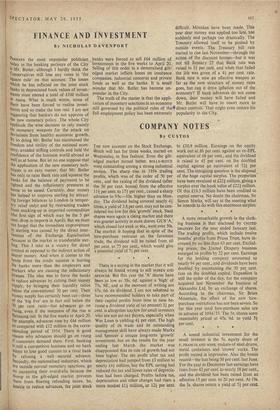FINANCE AND INVESTMENT
By NICHOLAS DAVENPORT
PERHAPS the most unpopular politician today in the banking parlours of the City is Mr. Butler, although I hardly think the Conservatives will lose any votes in 'the square mile' on that account. The losses Which he has inflicted on the joint stock banks in depreciated book values of invest- ments must exceed a total of £100 million or more. What is much worse, some of them have been forced to realise invest- ments and so make the loss real. I am not suggesting that bankers do not approve of the new monetary policy. The whole City applauds the wise decision to rely mainly On monetary weapons for the attack on de viations from healthy economic growth. By so doing Mr. Butler has maintained the freedom and virility of the national econ- omy, avoided stifling controls and held the confidence of the business world abroad as Well as at home. But let no one suppose that the application of the new monetary tech- niques is an easy matter, that Mr. Butler has only to raise Bank rate and squeeze the banks for the balance of payments to be righted and the inflationary pressures at home to be eased. Certainly, dear money has helped to improve sterling by attract- ing foreign balances to London (a tempor- ary relief only) and by restraining traders from stocking-up in imported commodities (the first sign of which may be the 5 per Celt. drop in imports in April). But we must not forget that the immediate improvement i" sterling was caused by the direct inter- vention of the Exchange Equalisation 'Account in the market in transferable ster- ling, This I take as a victory for direct Control as opposed to the indirect action of dearer money. And when it comes to the home front the credit squeeze is hurting the banks more than the employers and Workers who are causing the inflationary stresses. The idea was to force the banks to reduce advances by cutting their money supply, by bringing their liquidity ratios below the conventional 30 per cent. Their Money supply has certainly been cut—three of the 'big five' are in fact still below the 30 per cent. ratio—but advances go on 'king, even if the steepness of the rise is flattening out. In the five weeks to April 20. for example, advances rose by £44 million as compared with £12 million in the corre- sponding period of 1954. There is good reason why advances should go on rising if customers demand them. First, banking is still a competitive business and no bank Wants to lose good custom to a rival bank by refusing a well - secured advance. Secondly, the nationalised industries, which a 'e outside normal monetary sanctions, go 01 increasing their overdrafts because the slump in the gilt-edged market prevents them from floating refunding issues. So, Unable to reduce advances, the joint stock
banks were forced to sell £64 million of investments in the five weeks to April 20. Selling of this order in a demoralised gilt- edged market inflicts losses on insurance companies, industrial concerns and private funds as well as the banks. It is Small wonder that Mr. Butler has become un- popular in the City.
The truth of the matter is that the appli- cation of monetary sanctions in an economy still governed by the political rules of the* full employment policy has been extremely
difficult. Mistakes have been made. This year dear money was applied too late, too suddenly and perhaps too drastically. The Treasury allowed itself to be pushed by outside events. The Treasury bill rate started to rise last November—through the action of the discount houses—but it was not till January 27 that Bank rate was raised to 3+ per cent. and when that failed the jolt was given of a 4+ per cent. rate. Bank rate is now an effective weapon as far as the new structure of money rates goes, but can it drive inflation out of the economy? If bank advances do not come down, dear money will have failed and Mr. Butler will have to resort more to direct controls. That might even restore his popularity in the City.










































 Previous page
Previous page